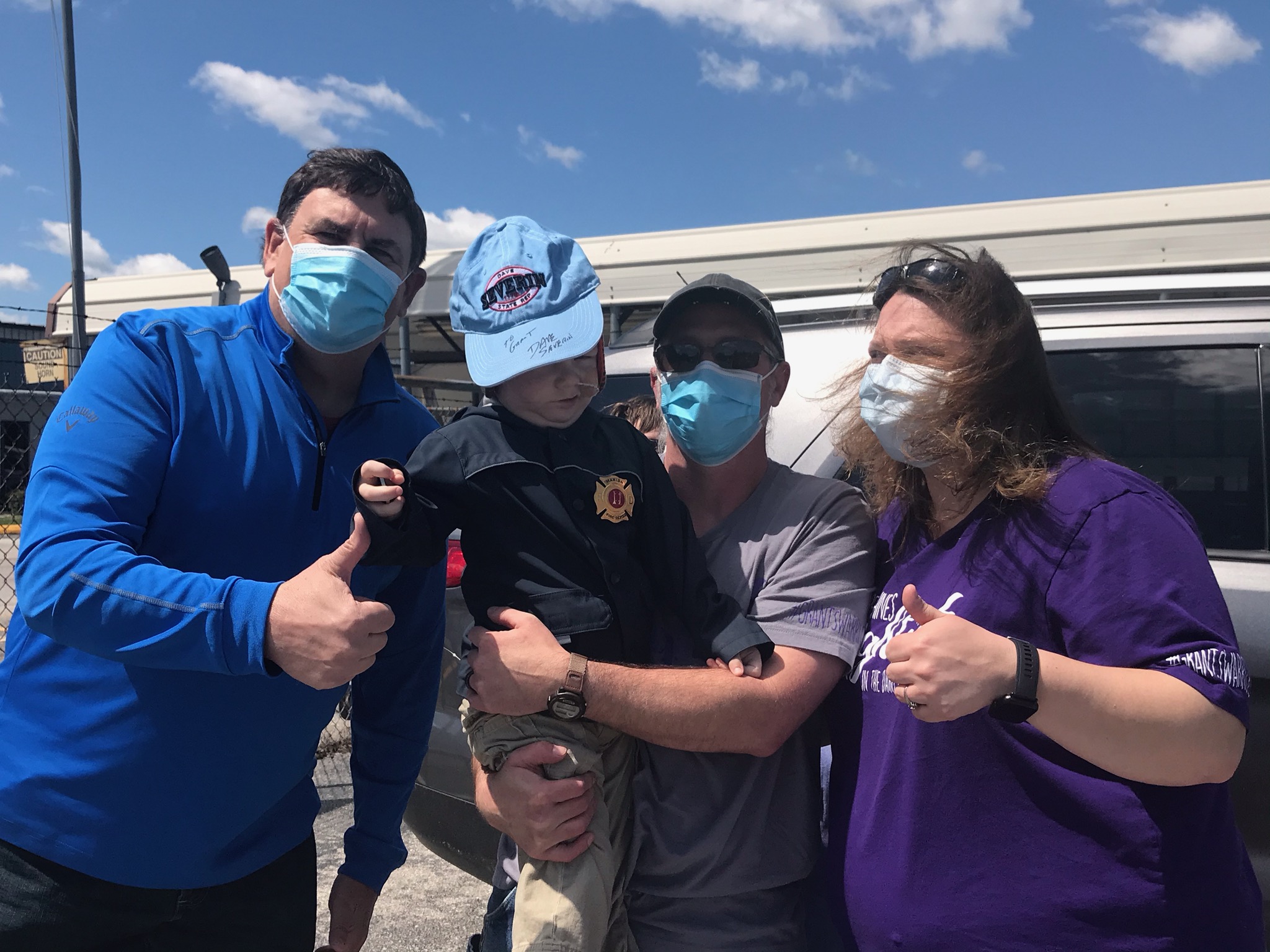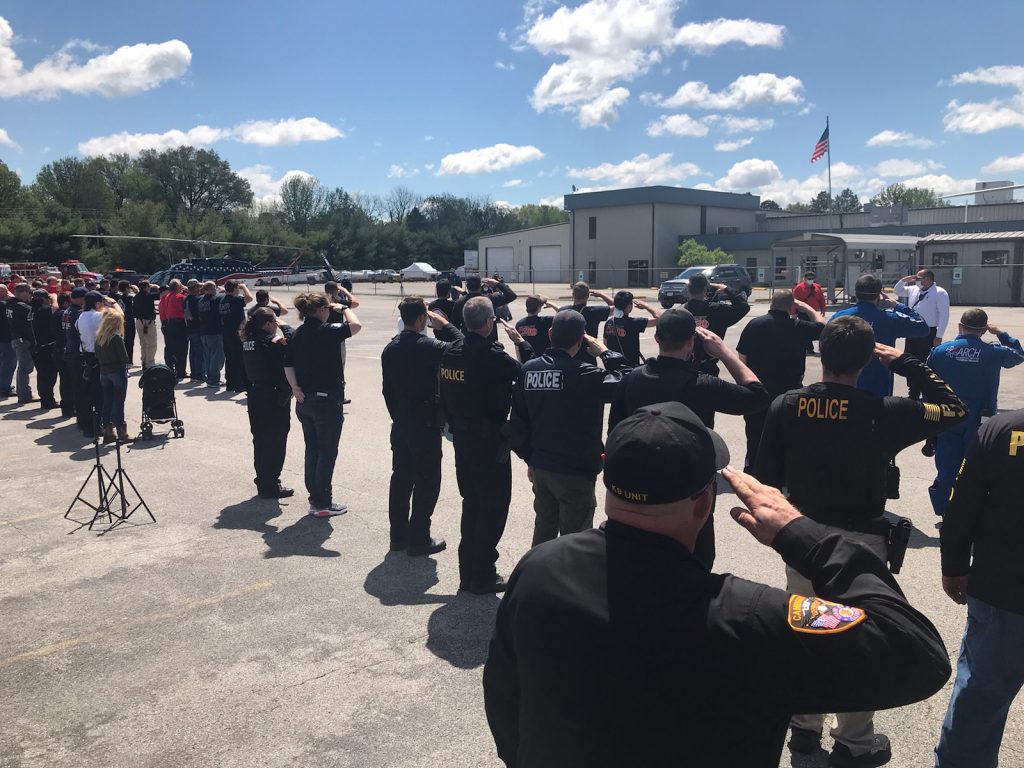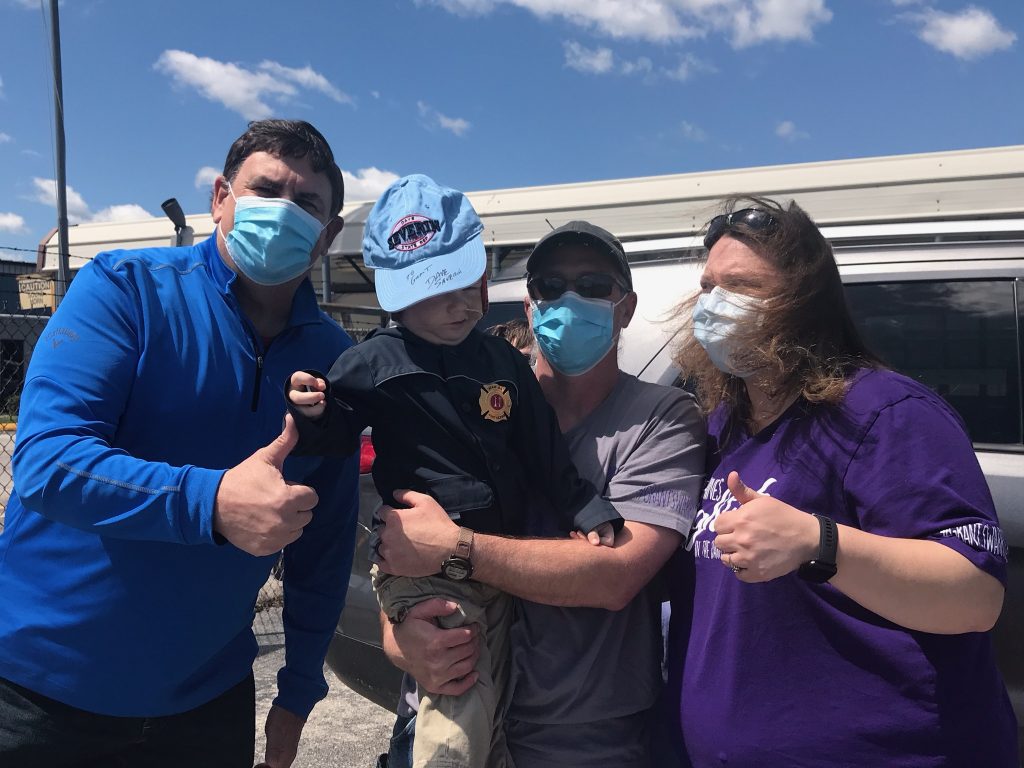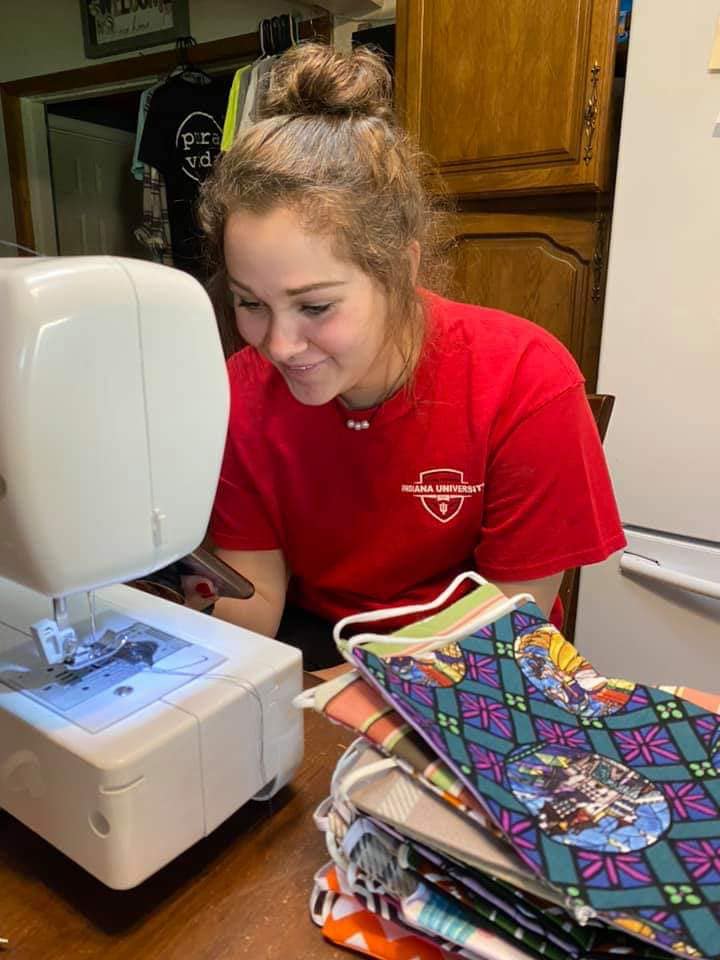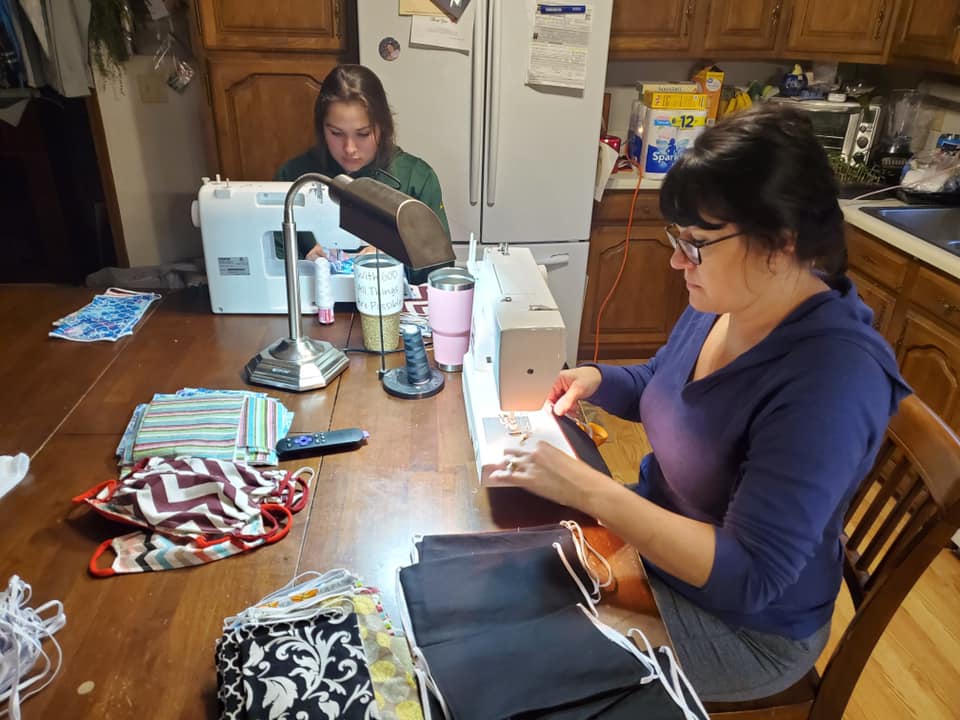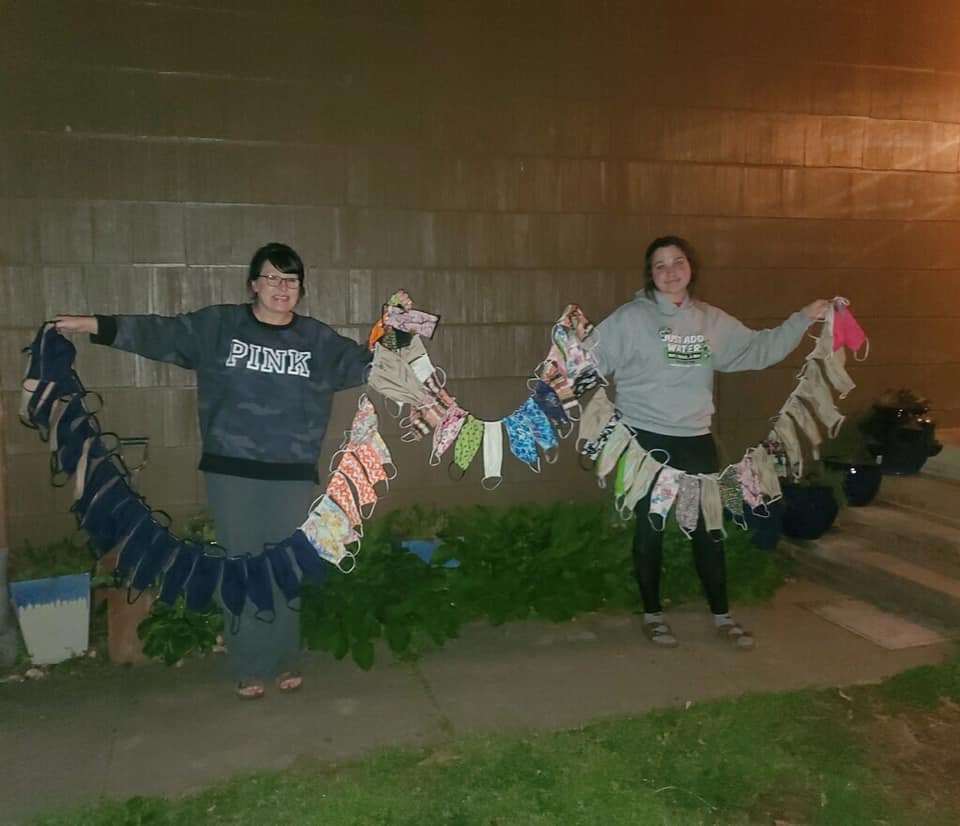Dear Friend,
Before I get to news and notes on state government and politics this week, I want to take a moment to highlight one of the most special events I have ever attended.
A drive through Birthday Parade was held on Thursday April 30 in honor of a special 3 year old young man named Grant. Grant is battling terminal cancer, and his parents and the community wanted to do something special.
An amazing turnout of police, fire, ems, and other first responders filled the parking lot of Crownline Boats in West Frankfort for a massive parade. It is times like these that I know Southern Illinois is strong enough to make it through any adversity. WE are in this together, and when we come together to make a day special for a family that is struggling, we have done something to serve a higher purpose. Thank you to everyone that drove through to say Happy Birthday to little Grant. Please keep him and his family in your prayers.
Legislators Need to Get Back to Work, but Madigan Cancels Session
An announcement came this week from House Speaker Mike Madigan’s office canceling the legislative Session days that were scheduled to take place last week. The COVID-19 outbreak and the subsequent fallout from it have canceled all Session days since mid-March.
As you may know by now, I have been calling on Speaker Madigan and Governor Pritzker to bring the legislature back into Session. Other states are figuring out ways to conduct the business of the people in safe, creative ways.
The lack of imagination, the lack of ambition, the lack of sheer will to figure out a safe system to get lawmakers back to work is one of the biggest failures wrought on the people of Illinois during this entire crisis.
The fact that the legislature isn’t in Springfield working means that Governor Pritzker has had to basically govern the state by Executive Order. I believe government works best when the legislature, the executive, and the judicial branch are up and running. Our system of checks and balances was designed to allow for direct representation of the people, by the people, and for the people. For weeks, Illinois has been run by one person from one party. That is not what the framers of our US or State Constitutions had in mind.
Although the law allows the Governor certain powers to take unilateral action during times of emergency, I believe it is time that he and Speaker Madigan come up with a way for the other CO EQUAL branch of government to perform its constitutionally-mandated function of advise and consent. We pass laws, the governor signs them or doesn’t…that’s how it works!
SOME STATE PARKS REOPENING MAY 1
Great news from the Illinois Department of Natural Resources
today as more state parks and recreational areas in Southern Illinois are now open. In my district this includes, Cache River State Natural Area, Cave-In-Rock State Park, Dixon Springs State Park, Ferne Clyffe State Park, Fort Massac State Park, Giant City State Park, Hamilton County SFWA, Horseshoe Lake – Alexander SFWA, Saline County SFWA, Tunnel Hill State Trail and Wayne Fitzgerrell SRA.

GRADUATIONS CANCELED – GRADUATIONS REINSTATED
Some of the Governor’s orders and guidance from some state agencies have made very little sense. One such decision that was made, and then reversed, earlier this week was the cancelation of all graduation services for K-12 schools. You can read my reaction to the cancelation at the links below:
After I issued that statement, I was amazed at the reaction it received. The people of Southern Illinois sounded off in a big way, and your voices were heard. Late Friday, school districts received a new message from IL State Superintendent of Schools Carmen Ayala, reversing the decision:
Dear Colleagues:
We have received your feedback. ISBE is acting quickly to develop updated recommendations for graduation ceremonies in consultation with the Illinois Department of Public Health to align with the new disaster proclamation and updated stay-at-home order that the Governor enacted yesterday.
The safety and wellbeing of students, families, and educators must be the number one priority. However, we understand the milestone that graduation ceremonies represent in our lives and are developing guidelines that encourage creative alternatives to the traditional graduation ceremony.
Thank you for your ongoing partnership, dialogue, and patience as we navigate this uncharted territory together.
Sincerely,
Dr. Carmen I. Ayala
State Superintendent of Education
Illinois State Board of Education
Religious services may now resume with social distancing
The first stay-at-home order, promulgated in mid-March, asked Illinois places of religious worship gathering to suspend their congregational services. Compliance was high among Illinoisans of faith, despite the difficulty imposed by the order. Now for May 2020, the modified terms of the current stay-at-home order will allow for the limited resumption of some religious services and gatherings. Religious worship services must comply with social distancing requirements, with gatherings of no more than ten people.
More significant for larger places of religious worship was another feature of the May order, which specifically authorizes drive-in church services. The members of the congregation, in their motor vehicles, will be able to congregate in fellowship. The limited carve-out for some forms of religious worship followed the filing of a lawsuit against the previous stay-at-home order by the Beloved Church of Lena, in Stephenson County, Illinois, and the Thomas More Society.
Unbanked residents get help with stimulus checks
May 1, 2020

Today, The Illinois Department of Professional and Financial Regulation (IDFPR) announced new options for unbanked Illinoisans seeking to cash their stimulus checks without incurring check cashing fees. The FDIC estimates that over 22% of Illinois households are under or unbanked. Many of these Illinois households will be receiving paper stimulus checks and will have few check cashing options that won’t incur fees. Working together with industry associations, advocacy groups, and individual banks, IDFPR is proud to announce a number of banking institutions that are able to work with non-customers on cashing their stimulus checks for free. Wells Fargo, JPMorgan Chase, U.S. Bank, Fifth Third and First Midwest, as well as others, are willing to provide non-customers in Illinoisans with check cashing options in order to ensure these funds go toward the food, housing, and necessities that people need during this difficult time, instead of being used on processing fees.
In order to ensure proper social distancing and that everyone has the proper identification to cash their federal stimulus check, individuals interested in these options should contact the banks listed above, or email IDFPR at [email protected] to set up an appointment.
In addition, a working group of nonprofits including Ladder Up, the Economic Awareness Council, New America, Heartland Alliance, and Woodstock Institute have launched a website to help individuals access their economic impact payment and to help the unbanked as well. Consumers can visit www.getmypaymentil.org to access clear information about how they can receive their payments. For people who are interested in taking this opportunity to open up their own bank account, the website also outlines safe, affordable banking options available through the Bank On program. This program certifies products as consumer-friendly financial service options that have no maintenance or inactivity fees, low minimum deposits, and no overdraft. For more information on the national Bank On initiative please visit https://covidbanking.joinbankon.org
Illinois Humanities Emergency Relief Grants
April 29, 2020

The National Endowment for the Humanities (NEH) has received $75 million in supplemental funding to assist humanities and cultural institutions affected by the coronavirus as part of the CARES Act. As the state affiliate for the NEH, Illinois Humanities is awarding more than $600,000 in special general operating and program grants to humanities and cultural non-profits throughout the state.
Illinois Humanities is committed to ensuring access to free, high-quality humanities experiences throughout Illinois. COVID-19 has put an unprecedented strain on non-profit organizations in Illinois and on the people who make public humanities happen. With the support of funding from the National Endowment for the Humanities through the CARES Act, Illinois Humanities COVID-19 Emergency Relief Grants will provide $635,000 in general operating and program support to humanities and cultural nonprofits throughout Illinois. The deadline for general operating support is May 15th and the deadline for program support is June 15th.
The main goals of the Illinois Humanities COVID-19 Emergency Relief Grants are to:
1) Provide emergency relief support for humanities-based organizations throughout the state who are impacted by COVID-19;
2) Help enable humanities-based organizations to innovate, adapt, and strengthen access to their programming;
3) Support humanities-based efforts to make community experiences during the pandemic visible and highlight resiliency throughout the state.
Grants for General Operating Support
Illinois Humanities will provide $475,000 in emergency relief general operating grants for humanities and cultural non-profit organizations with budgets up to $1.5M impacted by COVID-19. Two funding pools are available: one designated for organizations based within Cook County and one designated for organizations based outside Cook County. The deadline for general operating support applications is May 15th.
ELIGIBILITY
- Non-profit humanities and cultural organizations based in Illinois with a demonstrated commitment to the public humanities.
- Annual budgets of $1.5M or less.
- 501c3 status or non-profits designated by the state.
- The following types of organizations are ineligible for general operating support: public libraries; K-12 schools; universities, colleges, and academic departments; chapters of national organizations; organizations focused solely on the arts that do not have an explicit commitment to humanities programming; for-profit organizations; religious organizations; individuals; and recipients of the first round of Illinois Humanities COVID-19 Emergency Relief Grants.
Grants for Program Innovation and Adaptation
Illinois Humanities emergency relief program grants support the efforts of humanities-based organizations to innovate, adapt, and strengthen programming. Illinois Humanities will be awarding $100,000 in program innovation and adaptation grants. Examples of this type of support include (but are not limited to): efforts to digitize or archive content; moving programs to virtual platforms; community engagement; closed-captioning, translation, and other accessibility efforts for digital and virtual content; involving humanists to develop new content or public programs. The deadline for program innovation and adaptation support is June 15th. Applications will be available May 15.
ELIGIBILITY
- Non-profit humanities and cultural organizations based in Illinois with a demonstrated commitment to the public humanities.
- Annual budgets of $1.5M or less.
- 501c3 status or non-profits designated by the state.
- The following types of organizations are ineligible: K-12 schools; universities, colleges, and academic departments; chapters of national organizations; organizations focused solely on the arts that do not have an explicit commitment to humanities programming; for-profit organizations; religious organizations; individuals.
Illinois Humanities will fund a collective project that mobilizes the humanities to make visible the experiences of Illinoisans during the pandemic in order to highlight community resiliency and solidarity throughout the state. Illinois Humanities will award grants totaling $60,000 for this initiative. Details will be announced on May 15th.
If you have further questions, reach out to Mark Hallett, Program Manager, Grants, at [email protected]
Getting tested for COVID-19
April 27, 2020

Anyone with COVID-19-like illness or symptoms can get a test, even without a doctor’s order.
As testing capacity expands, testing is now available for people who:
Have COVID-19 symptoms (cough, shortness of breath and fever) OR have a risk factor, such as
- Contact with someone confirmed to have COVID-19
- A compromised immune system or a serious chronic medical condition
Testing is also available for those with or without symptoms who:
- Work in a health care facility
- Work in correctional facilities, such as jails or prisons
- Serve as first responders, such as paramedics, emergency medical technicians, law enforcement officers or firefighters
- Support critical infrastructure, such as workers in grocery stores, pharmacies, restaurants, gas stations, public utilities, factories, childcare and sanitation
Who pays for COVID-19 testing?
Under the Families First Corona Virus Response Act, all comprehensive health insurance plans must pick up 100% of the cost of coronavirus testing, as well as any visit to the emergency room, doctor’s office or urgent care center that may have led to that testing. That includes any COVID-19 test deemed appropriate by the U.S. Department of Health and Human Services.
Comprehensive health plans are individual, employer-sponsored or exchange plans that meet the coverage requirements spelled out in the Affordable Care Act. If you’re insured by a short-term plan or another plan that isn’t ACA-compliant, your insurer may not cover the costs associated with your test.
Insurers must also cover antibody testing for COVID-19 patients under the Coronavirus Aid, Relief and Economic Security (CARES) Act. By measuring blood for immune proteins, antibody testing may indicate that someone has had a coronavirus infection and may be protected from future infections.
Medicaid will cover the full cost of COVID-19 testing for the uninsured, as directed by the CARES Act.
Medicare Part B (Medical Insurance) covers a test to see if you have coronavirus (officially called 2019-novel coronavirus or COVID-19). This test is covered when your doctor or other health care provider orders it.
- List of testing sites in Illinois
- Health Insurance Coverage FAQs
- Association of Health Insurance Providers FAQs
This past Tuesday was National Superhero Day. I want to give a big shout out to Janee Richardson and her daughter Laindree, who are making a difference and have become heroes in this time of need. They have made and donated over 2000 face masks and counting! Thank you to these Southern Illinois Superheroes!
Stay Connected!
My office is still offering remote constituent services. You can contact my office staff by calling 618-440-5090 or email me at [email protected].
